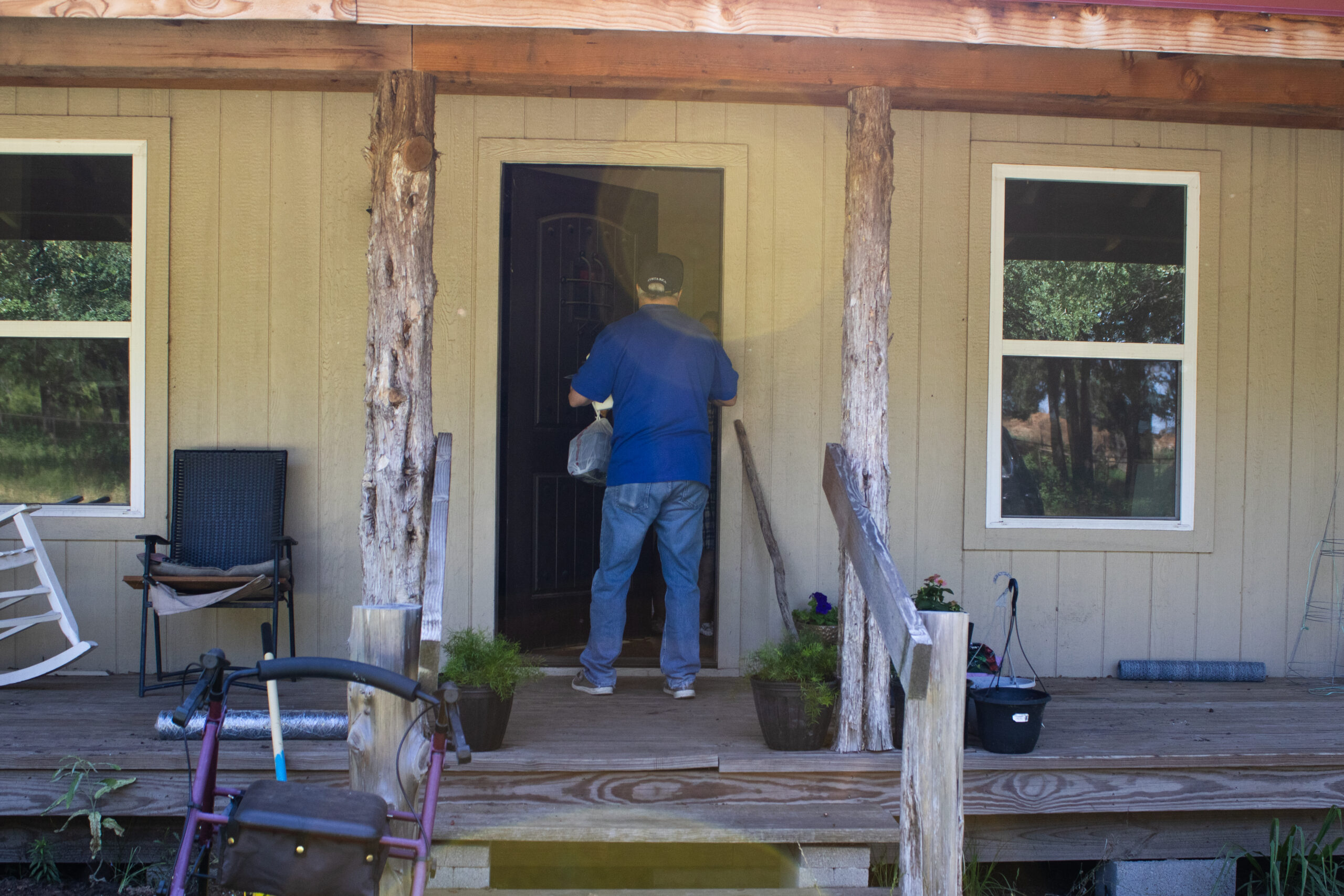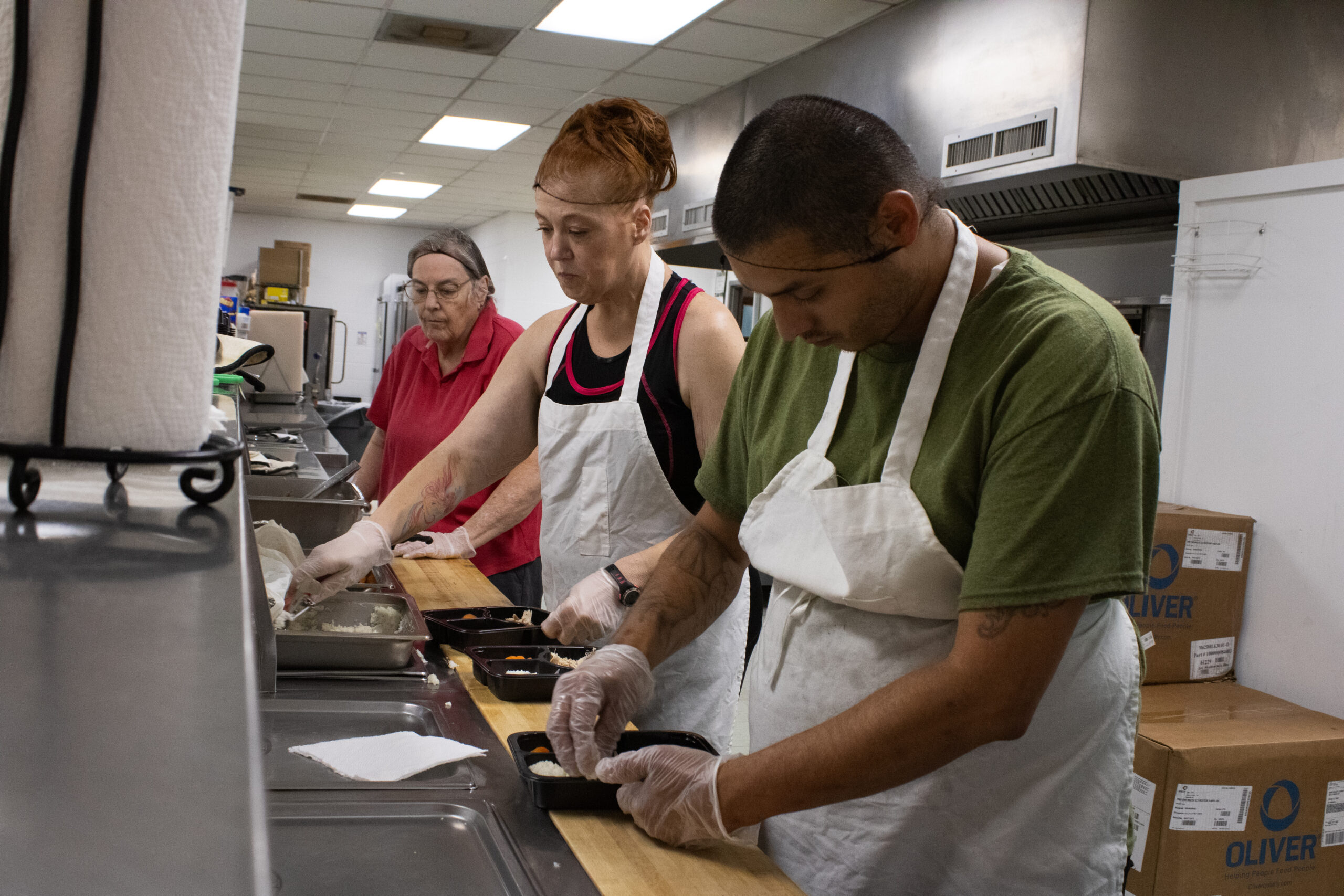
Meals on Wheels volunteer Stan Shults delivers food to a Meals on Wheels recipient. Shults takes his delivery route every Tuesday, and has come to be known by everyone he delivers to. Alexis Bishop | Wise County Messenger
The Wise County Meals on Wheels program has scaled back meal deliveries in 2025 despite a growing number of Wise County seniors experiencing food insecurity.
The nonprofit program, coordinated by the Wise County Committee on Aging (WCCA), received additional federal funding during the COVID-19 pandemic, but the Older Americans Act, which provided about $250,000 of their $900,000 operating budget, was not renewed in 2024.
For the homebound seniors in Wise County, that’s meant fewer meals and less frequent deliveries.
“During the COVID time period, we had more federal funding — like we needed for the regular time,” said WCCA Director Amy Pegues. “So they gave us lots of funding during COVID, and then they said, ‘Oh, you can’t have that money anymore, we gotta take it back’ … instead of saying, ‘Oh wow, y’all really stepped up to the plate and helped everybody during COVID. We see how much money y’all actually need — we’re gonna keep helping you with that.’”
Recipients currently receive one hot meal, four frozen meals and a half-gallon of milk each week. It’s a stark contrast to the 2021 delivery schedule in Decatur, when Meals on Wheels delivered hot meals five times a week, plus two frozen meals on Fridays for the weekend.
Federal funding accounts for about 45 percent of the nonprofit’s budget. The county’s demographics and growth have widened the gap of unmet needs for the organization.
“It’s growing,” Pegues said. “And unless we get the funds through fundraising or donations, we’re never going to keep up.”
Wise County residents over the age of 60 now account for about 24 percent of Wise County’s population, according to the most recent U.S. Census Bureau estimates. As Baby Boomers get older, pressure is increasing for Meals on Wheels to expand.
Pegues said the most realistic path forward is bolstering local support.
“As long as we are relying so heavily on federal funding, we can’t grow very much,” she said. “However, if we have other fundraisers and other ways to bring in funds, then our program can grow like it needs to grow.”
According to Pegues, the federal agency has said funding will remain the same next year. Members of the organization have asked city councils across Wise County to include donations to the nonprofit in their budgets. They’re also seeking support through fundraisers, including their “Buy a Meal for a Senior” program. The program offers one-time donations to cover the cost of a single meal — calculated at $8.85 to prepare and deliver — as well as recurring weekly, monthly and yearly options.
“The more seniors we can put on our program, the more seniors that will not suffer from food insecurity,” Pegues said.
Food insecurity is a common problem for seniors, Pegues added.
“People don’t even realize that sometimes food insecurity is — even though they know they’re gonna have a meal delivered — it’s ‘What am I eating?’ ‘What am I gonna have delivered?’” she said. “For some seniors, it’s knowing every day that they can go look at our menu that we’re delivering and know what they’re gonna have for lunch that day. For some people, that’s just peace of mind.”
WCCA provides other services to seniors besides Meals on Wheels, including rides to medical facilities and legal and nutritional education sessions.
Currently, the WCCA is planning to build a new combined office and kitchen next to the senior center. They hope a centralized location will increase efficiency, as they are currently operating from three different facilities. Meals are prepared in Chico, while the office and senior center are in Decatur.
The work for food security

Meals on Wheels kitchen staff package meals for seniors in an assembly line for efficiency. They pack coolers with the meals needed for each delivery route, then call out when to package the next route’s food. Alexis Bishop | Wise County Messenger
Facing the challenge of food security
The work to feed hundreds of Wise County seniors begins early at the former Chico Elementary School building.
The kitchen staff starts preparing food at around 6 a.m. Cooking is completed by 9 a.m., after which meals are packaged and placed in coolers for delivery.
It may seem like a small operation, but the staff prepare 100,000 meals a year. The meals are then taken to Decatur and delivered by hand to hundreds of recipients throughout the county.
Destiny Odell, a staff cook expected to become the assistant kitchen manager, said she applied for the job at the recommendation of her mother, who previously worked for WCCA at Meals on Wheels.
Although Odell enjoys the work, the volume can be challenging.
“It can be pretty heavy some days,” she said. “The amount of food we’re having to make — it’s pretty difficult, but we get by.”
Even when it’s tough, she said she knows the work matters.
“Giving back to the community, feeding the elderly — it’s very rewarding,” Odell said.
Kitchen staff often prep food a day in advance when orders are especially high.
Once out of the kitchen, drivers load up meals and head out on various routes.
Stan Shults is one of several volunteers who deliver meals to homebound seniors. He runs a route in the Alvord area.
To him, it’s not just about dropping off food. It’s a weekly check-in.
“I talk to each person and make sure, ‘Hey, are you okay? Do you need anything?’” Stan Shults said. “We obviously feel really responsible for them.”
Volunteering has given the Shults family a deeper understanding of what some seniors go through. Barrie Shults, who also volunteers, said the need is often hidden.
“Some people just don’t have family or folks around that can help them,” she said. “Our families live close by, and we probably take that for granted. Not everyone has that. They’re not blessed and fortunate enough to have people around them to help.”
Recipients rely on the program for different reasons. Al Dudan, a senior in Alvord, said the meals help him cut food costs while managing medical bills.
“It’s a big help,” Dudan said. “And it’s great food. I really enjoy it, and once a week I see [Meals on Wheels], and it’s uplifting to see [them] coming around doing this for us.”
Ermalinda Perez, a recipient recovering from surgeries, said she’s thankful for the help.
“It’s a good feeling to have food in our refrigerator,” she said. “We don’t need to have everything to prepare a meal because [they’ll] have it fixed already.”
The unmet need gap is not just a Wise County issue. According to the Elder Economic Security Standard Index, nearly half of Americans over the age of 60 are unable to afford their basic needs. Nationally, one in three Meals on Wheels programs reported leaving seniors on a waitlist.
Volunteering to deliver meals is one way to lessen strains on the program.
Stan Shults said he enjoys visiting seniors like Dudan and Perez each week — and he hopes to continue for as long as he’s able.
“I feel like, as long as I can do this, I want to give back,” Shults said. “One day, I would like someone to be able to come to me and bring me a hot meal and bring me a smile.”



Loading Comments